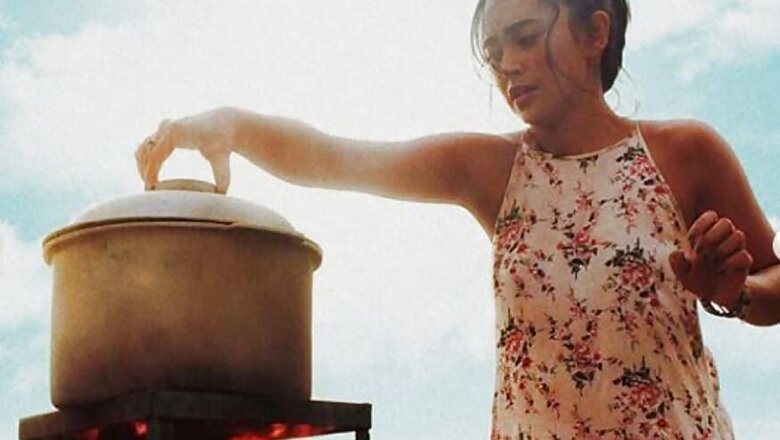
views
Axone
Cast: Sayani Gupta, Lin Laishram, Tenzin Dalha
Director: Nicholas Kharkongor
The film opens with a beautiful aerial shot of New Delhi overlooking the Qutub Minar, which transitions into an aerial view of cramped up buildings with dark alleys, and it pulls at the heartstrings of anyone who has ever lived in the city. We then see two girls walking with a sense of urgency through these dingy alleys at the early hours of the day, lowering their gaze and holding hands when they pass a man, and it pulls at the heartstring of every woman who has ever lived in the city, but with a very different emotion. They are accompanied by another friend, who leads them to a house and warns them about what is going on inside. It looks like a drug cartel situation but is actually a meat seller, and our protagonist quickly covers her nose. This time, it is the heartstring of a Northeasterner that is tugged.
Axone, by Nicholas Kharkongar, the critically acclaimed director of the 2016 film Mantra, is a tale of a group of friends who want to make a special pork dish for their best friend's wedding, but are met with resistance when an already racist neigbourhood turns hostile. The dish Axone, has a strong pungent aroma and like gossip, smells travel fast in this Humayunpur locality too, leading to a chain of events from this simple act of friendship.
Kharkongor has said that Axone is very personal to him and is inspired by his experiences of living out of Northeast for 20 years. Axone also manages to be deeply personal for every Northeasterner in Delhi too, because in the first five minutes of the film we see racial slurs, eve-teasing and slut-shaming escalating to a full act of violence, something that unfortunately feels way to familiar for a lot of us. For the North-Indian society, Axone holds up an ugly, uncomfortable mirror, all the while remaining what it is at heart, a comedy of errors.
In 2014, 20-year-old college student Nido Taniam from Arunachal Pradesh, died due to severe brain and lung damage after he was beaten up by a shopkeeper and other men with iron rods in Lajpat Nagar, South Delhi. A fight had broken out between Taniam and his murderers after they called him racial slurs and made fun of his dyed blonde hair. This had led to protest against racial discrimination in the capital, that was swiftly silenced. There is a subtle reference to that incident in the film, and not everyone seems to grasp it, because not everyone has to live through that horror. Not much has changed though, because now, six years later, several cases of racism against Northeastern students have surfaced after the Coronavirus outbreak, with people targeting them, throwing them out of their rented homes, spitting on them and even subjecting them to police brutality. Only on the basis of their race.
Nicholas Kharkongor, without being preachy, talks about the mental health issues of a group of people who deal with some form of racism or violence, every single day for being ambitious and exercising their Freedom of Movement guaranteed by the Indian Constitution. From panic attacks suffered by one of the two lead characters Chanbi (Lin Laishram) and Post Traumatic Stress Disorder faced by another character Bendang (Lanuakum Ao) after a life-altering event, the director has been sensitive enough to weave these issues well into a comedy.
Kharkongor also discusses casual racism within Northeastern community. Upasna, played by Sayani Gupta, always feels like an outsider because she is Nepali and has been treated as if she is not “Northeastern enough” by her best friends. He also addresses privilege, how a Northeastern with South Asian features and a North-Indian sounding name (myself included) often gets immunity from the worst kind of discrimination faced by those with more East-Asian features. This is a bold move and needs to be applauded.
Over the years, there has been way too less stories from the Northeast told in the mainstream. Out of the countable few (3 probably) there are films like Dil Se by Mani Ratnam which straight up uses a traumatic event in history as a backdrop to glorify a sexual predator as a classic lover and does nothing for the region. In another category is a Mary Kom, the biopic of the six-time World Boxing Champion from Manipur, played by a North-Indian A-lister, and makeup is used to make her eyes look smaller. Do we need to say anything more than that? Kharkongor atones this sin.
There is no doubt Sayani Gupta is a great performer. Her casting addressed by Upasna’s layered ethnicity and Sayani too gives a great performance as a woman who does not really know if she belongs or not. Lin Laishram as Chanbi is a delight and I only hope we see her in more projects. Tenzin Dalha, who has appeared in films like Margarita With a Straw and Guilty is extremely convincing as Zorem, a man who is a rock to his friends but is afraid of commitment. Dolly Ahluwalia and Vinay Pathak, as someone of their stature, are hilarious as the slightly-racist, bickering in-laws. Rohan Joshi gets the role of the North Indian friend with a learning curve and is quite hilarious. Lanuakam Ao, however, touches your heart the most. He isn’t dramatic or eloquent, he is just extremely authentic. His performance reminds you of someone you know. Adil Hussain's adorable cameo will make you smile. A special mention to Parasher Baruah's cinematography for making the dingiest places look aesthetic.
Axone is a perfect film for those who want to be better. Axone makes you acknowledge your privilege. That is exactly the energy we need for 2020.
Rating: 4/5
Follow @News18Movies for more
















Comments
0 comment